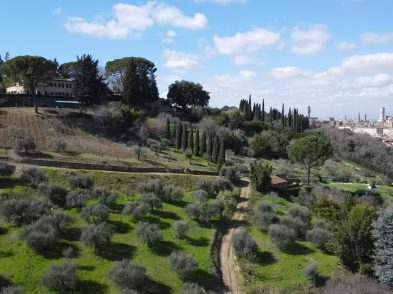In 1513, Florentine humanist Niccolò Machiavelli, from his place of exile in Sant’Andrea in Percussina (near San Casciano), announced that he had penned a new treatise. He was talking about De Principatibus, which is now universally referred to as The Prince. Today, along with Carlo Collodi’s Pinocchio, Machiavelli’s masterpiece is the book most frequently translated from Italian. TF interviewed Michael Griffiths, OBE, vice-chairman of the British Institute of Florence, about his upcoming lecture on this (in)famous historical figure.
TF: On the occasion of the 500th anniversary of the publication of Machiavelli’s The Prince, you are offering a sympathetic portrait of the author. What prompted you to do this?
Michael Griffiths: At Cambridge University, I read classical philosophy, which meant that I dug deep into the political philosophy of Plato (The Republic) and of Aristotle (The Politics), so my interest in political philosophy and the nature and organisation of the state and society in general dates back to then. Machiavelli was perhaps the first modern political philosopher, and I have always admired his study and experience of Florence’s Renaissance politics. Much maligned and misinterpreted, in my opinion, his honesty as a pragmatic political scientist deserves to be cast in a more positive and accurate light.
TF: The title of your lecture on June 12 at the British Institute is Machiavelli: The Disarmed Prophet. Where does the subtitle come from?
MG: It hails from Roberto Ridolfi’s biography of Machiavelli, which I believe to be one of the best biographies on Machiavelli. Ridolfi strives to understand the disillusionment of a patriot of Florentine and Italian independence, whose ‘independence’ failed to realise itself because of the interference from foreign powers and the Roman Catholic Church. Machiavelli was ‘disarmed’ because he was never able to achieve the military strength needed to defend Florence from outside domination.
TF: Can you tell us a little about your lecture and the 500th anniversary celebrations organized by the City of Florence?
MG: The aim of my lecture—and, I believe, the celebrations in general—is to illustrate Machiavelli’s qualities as a humanist and as a great Florentine patriot in looking at his political thought and theories, but also as a writer, poet and satirist in his comments on the life and times in which he lived.
TF: How important is it to view Machiavelli as a product of his time—and not quote him out of context?
MG: Absolutely essential. To understand Machiavelli one must first read The Discourses, in which he expounds his belief in a democratic republican state as the best form of government when based on the civic virtues of the Roman Republic, which he admired, such as loyalty to the state, acceptance of the law and the ability to defend oneself from outside attack. He only came to The Prince as a result of his disillusionment with Florence’s inability, or lack of willingness, to defend itself as an independent republic. All this meant that there was a need for a ‘strong man’ to defend that independence, but this was a solution of last resort after the failure of a democratic republic.
TF: To what extent do you feel the derogatory term ‘Machiavellian’ has had an impact on the modern view of Niccolò Machiavelli as a person?
MG: The concept that the ‘end justifies the means,’ which has come to be associated with the term ‘Machiavellian,’ has given rise to the negative perception of Machiavelli as a person, epitomized in those lines from Shakespeare’s Henry VI as ‘the murderous Machiavel,’ which I shall be quoting in full (Richard of Gloucester’s words as he plots to become the future Richard III) and refuting in the lecture on June 12.
TF: In your opinion, what were Machiavelli’s finest qualities?
MG: His intellectual honesty, his diplomatic skills as state secretary under the Soderini Republic, his strength in not yielding to torture when arrested after the fall of Soderini. He was also a writer of magnificent prose (just take a look at his letter to Francesco Vettori) and a poet of great psychological sensitivity (‘I smile but the smile does not enter inside’).
TF: The Prince is a treatise on statecraft and the importance of a lasting government. In what ways do Machiavelli’s writings still hold true, 500 years on, in the current Italian political climate?
MG: I am always a little wary about questions of this kind, which sometimes give a foreigner the opportunity to ‘preach’ to the Florentines (something I abhor), but in the current Italian political climate, Machiavelli’s call to revive the ‘civic virtues’ of confidence in, and loyalty to, a republican democratic state in defending itself against corruption and conflicts of interest (which requires faith in the ability of the ‘lex’ of the State to combat these ‘injustices’), can certainly ring a loud bell in combating the disillusionment of a significant part of the electorate: pace Grillo!
LECTURE
Machiavelli: The Disarmed Prophet
Wednesday, June 12, 6 pm
The British Institute of Florence








